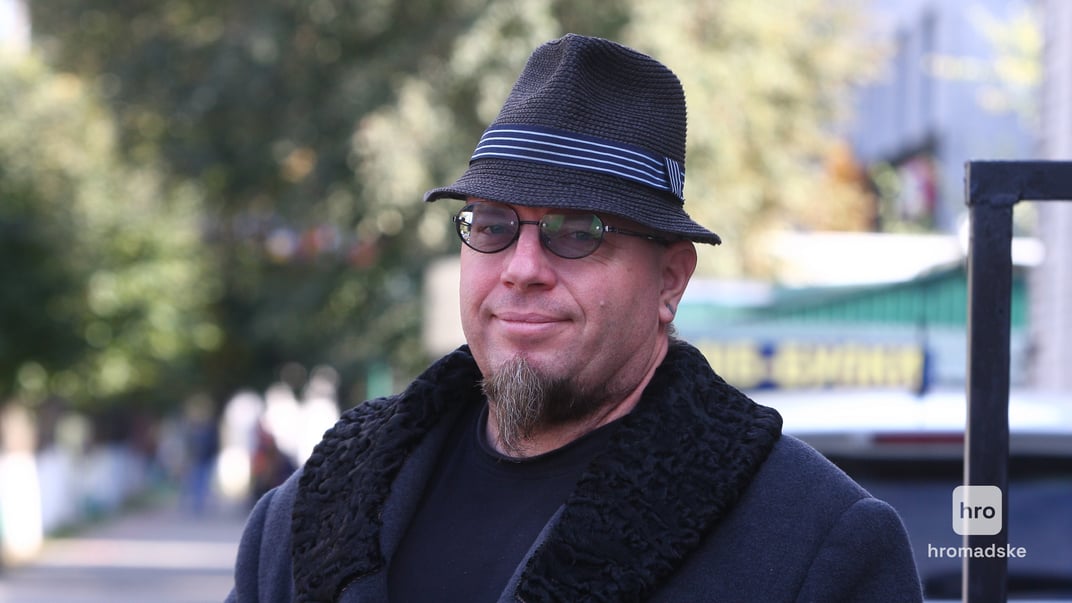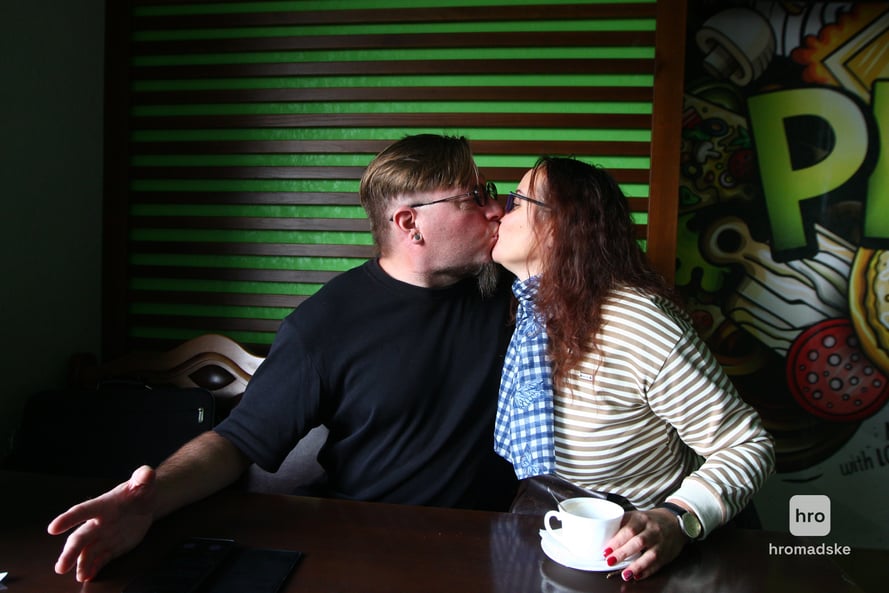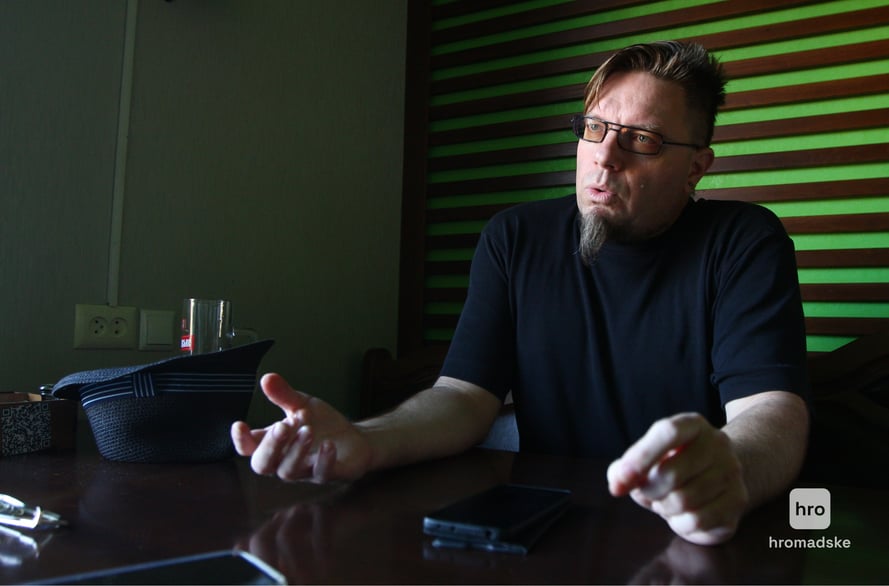"His lack of a toilet was a problem." An American who couldn't join the International Legion as a warrior.

“I thought a Ukrainian grandmother would kill me”
James first heard about Ukrainians in 2014. At the IT company where he worked in the U.S., there were several hired workers from Ukraine. They worked online from Kyiv and attended Maidan. Fascinated by his colleagues, James decided to visit Ukraine someday.
The opportunity arose five years later when his contract with a company where he served as a network administrator expired.
“I had some money, and I decided to travel to Europe. My grandfather was Norwegian, and I was looking for my roots, but there were so many people with that surname: I thought it was rare, but I found an entire town of people like me,” he laughs in a pizzeria. This is his favorite spot in Horodysche, where the waitstaff know his preferences. One of them brings him a cappuccino.
He didn’t find any traces of his heritage and continued on. He traveled around Europe by bicycle, and after breaking his leg and recovering, he hitchhiked. Norway, Sweden, Germany. Finally, in 2019, he arrived in Ukraine.
The first thing that struck him in Kyiv was a huge banner that read: “Freedom is our religion.”
“Americans are obsessed with freedom and democracy. In Ukraine, it’s in the air. Moreover, there are fewer rules here than, say, in Germany,” James shares his first impressions.
He was surprised that almost no one smiled in Ukraine, as you would not see that in the U.S.
“I thought that every grandmother in Ukraine wanted to kill me; I was afraid of them,” James pronounces the word “babka” in Ukrainian. “They walk around with such serious faces! Overall, a 'babka' in Ukraine is a whole phenomenon; I don’t understand why they won’t let you open the windows in a minibus even in the worst heat!”
The American settled in Kyiv and started teaching English at a private school. Suddenly, a lockdown due to COVID-19 occurred. Cafés and parks closed to visitors, and communication mostly shifted online. That’s how James met Oksana.

“I fell in love with a Ukrainian because she apologized”
Two years before the pandemic, Oksana decided that working as an operator at “Epicenter” was not enough; she wanted to grow. To do that, she needed to learn English. She attended various courses and practiced with native speakers on different websites, where she met James. After some correspondence, this cheerful, vocal man captured her heart. Just then, summer café terraces opened, and James suggested they meet.
“At that time, my vocabulary wasn’t as extensive as it is now, but it helped that he spoke most of the time. Americans tend to spill all the family secrets right away. So after an hour, I knew about his grandparents, aunts, and uncles,” recalls the dark-haired woman whom her husband calls baby.
She also learned about his past relationships: he has an adult son from his first marriage. His second wife left him with their son who has autism after their separation. The boy has grown up and gotten married. In his third attempt, James sought happiness with a woman who already had a child. Their joint daughter was born from this marriage.
“So, in fact, he has three biological children and one adopted. He also has grandchildren. When we met, I was around forty. It just happened that I lived alone all my life. I took his experiences wisely and sensibly: what was, was,” Oksana reflects.
“I liked her right away because she knows how to embroider, and I immediately dreamed of a vyshyvanka,” the man jokes.
“There’s a grain of truth in every joke,” Oksana looks at him. She knows he loves interesting clothing.
James is passionate about historical reenactments, especially from the Viking period. He attends festivals, engages in sword fighting, and owns a helmet and armor. He has sewn quite a bit of footwear, shirts, bags, and belts in an ancient style. He says his full name is James Arthur, just like King Arthur.
“What struck me was that Oksana apologized for something. You don’t hear that in the U.S. Women, if they want something, manipulate. It complicates relationships. It’s not easy in Europe either: women are primarily interested in how much you earn. During my trip, two women in Germany and one man in Sweden proposed marriage. He was my friend and wanted to make my stay in the country easier if I decided to stay there.
Oksana was so sincere that it was even unusual. She’s simple, dressed in ordinary jeans, and her lips aren’t plump. I liked that she doesn’t wear a crown. Although she is a princess,” he kisses her on the temple, and she kisses him on the shoulder.
“But he didn’t plan to get married; he had been too burned in the past. We got engaged so we wouldn’t lose each other in the war,” Oksana honestly admits.

“Am I a coward to run away?”
Before the large-scale war began, they managed to live together for about a year. They discovered that Oksana is against having guests wear shoes in the house and spicy Mexican food, while James dislikes aspic and the separation of clothes into home and going-out attire.
The practical and rational nature of the Ukrainian woman clashed with the romantic nature of the American man. When he shared his plans to open his English school or restore old houses in villages with the help of volunteers and give them to displaced people, Oksana saw so many obstacles that she immediately dismissed the ideas.
However, they adapted to each other: each cooks separately, slippers can be worn, the main thing is that there is love, understanding, and common interests. Oksana embroidered him a shirt with a pattern resembling runes, and James crafted her a odyahanka for historical reenactment festivals. Unfortunately, they only managed to attend one festival.
A few days before the invasion by Russia, the couple got married. At that time, the U.S. embassy was urging its citizens to return to the U.S. with all its might, but the man had no intention of leaving.
“Don’t think that life in America is better,” he explains. The question from Ukrainians, “Why didn’t you leave?” has begun to irritate him. “Life there is just different. Yes, there is no war, but it could start at any moment. Also, am I a coward to run away?”
James asked his wife to evacuate from Kyiv to Lviv while he planned to go fight. But trains to the west were overcrowded, so the couple went to Horodysche, to Oksana’s parents.
In the middle of the night, while his wife was sleeping, James repeatedly wanted to join the army. She stopped him at the door.
“First of all, there’s a curfew; I didn’t want anything to happen to him. Secondly, he doesn’t know the language. Also, he’s a bit like a child, living in illusions: he thinks of himself as a hero, a Viking, a Superman. How could he not want to fight? How can he look into the eyes of those he competed with in reenactments? But war is not a game, and I realized that,” the woman explains.
“I’m not unique in defending someone else’s country. If Russia wins, it will affect democracy worldwide. It’s important that someone fights for freedom,” James firmly argues back.
Then, in 2022, tired of arguing with him and proving that fighting can take many forms, Oksana agreed to let her husband go to the army. But she didn’t lead him by the hand to the enlistment office.
He found an English-speaking worker at the TCC and explained what he wanted. They promised to call him back. A whole year passed before James was invited to training at the Yavoriv training ground.
“The International Legion had already been formed; there were trainers from NATO and Ukrainian commanders. Volunteers from other countries came to fight: Colombians, Mexicans—diverse backgrounds.
They registered him there; they lived in the barracks with everyone. Our guys know what that’s like. For him, a street shower and toilet were stress, shock, and horror. How could there be a hole in the floor? How could there not be a toilet? You have to sit on something. I ask, ‘How are you going to fight in the woods, in a trench?’ And he laughs, saying he’ll